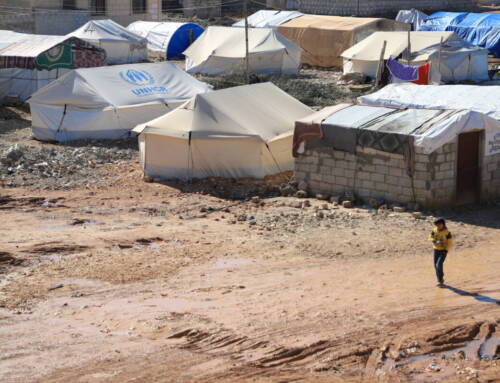Turkish-backed forces encroach on Kurdish-held northern Syria amid rising tensions
For months, Turkish bombs have fallen on Afrin, an isolated […]
31 July 2017
For months, Turkish bombs have fallen on Afrin, an isolated pocket of Kurdish-held territory in northwestern Syria.
The airstrikes, purportedly targeting members of the Kurdish People’s Protection Units (YPG), are the latest in series of clashes between Kurdish militias and pro-Turkish forces that have dragged on for months.
Afrin is the most vulnerable part of the de facto autonomous Kurdish territories in northern Syria known as Rojava, or western Kurdistan. Running along Syria’s northern border, the Kurdish-controlled areas have long been a thorn in the side of the Turkish government.
The Self-Administration that governs Rojava is led by the Kurdish Democratic Union Party (PYD), which has links to the Kurdistan Workers’ Party (PKK). The PKK has waged a bitter and bloody insurgency inside Turkey for decades.
The PYD’s armed wing, the YPG, defends Rojava. For months, the YPG has sporadically clashed on the edges of Afrin with the Syrian rebels who Ankara supports in northern Syria. At the same time, Turkish shelling has frequently targeted YPG positions near Afrin and in the northern Aleppo countryside.

Ankara accuses the PYD of having the same ideology, leadership and tactics as the PKK, and accuses the YPG of launching attacks on Turkish positions in Syria.
In July, Turkish shelling and airstrikes became more frequent, with artillery and bombs striking the Afrin area on an almost daily basis, Alaa Abdelrahman, a 31-year-old Kurdish Afrin resident and journalist with the Asso News Network, tells Syria Direct’s Muhammed Al-Haj Ali.
Concerned residents, though grown accustomed to regular bombings, launched several large demonstrations in recent weeks calling for an end to the bombings in Rojava. The largest demonstration took place in Afrin on July 5, with tens of thousands of residents participating in the largest protest in northern Syria since the beginning of the revolution.
Street demonstrations have continued all month to protest “Turkish interventionism,” Abdelrahman says.
Q: What’s the goal behind the recent protests in northern Syria?
The goal of these protests and activities in Afrin is to send a message to the international community about Turkish military intervention in northern Syria, and to stand alongside the People’s Protection Units who are fighting with the Syrian Democratic Forces.
Q: Why did you participate in last week’s demonstration?
This is the second time in two weeks that residents of Afrin have protested. The protests denounce the Turkish bombardment [of the area], as well as the Euphrates Shield operation.
Q: Was there a specific part of the community that participated in the demonstrations? Or did a large section of the community participate?
The demonstrators were from all parts of the community: doctors, teachers, laborers, politicians, thinkers, humanitarian organizations, civil society organizations, along with the political parties that supported the demonstration.
Q: How large was the demonstration last week? Who organized it?
It’s estimated that thousands came out to protest, although there are no accurate statistics available.
The protest came after a call from a number of Kurdish political parties, including the Kurdish Self-Administration and the PYD.
The local al-Amirat and al-Bubna tribes, which make up the Syrian National Coalition’s Arab component in Afrin, also participated.
Q: What do you know about the Turkish military strikes in Afrin?
Since the beginning of this month, the bombings have not let up.
The bombings have injured civilians in rural Afrin and a-Shiba, with shells landing on homes and causing great damage.
Q: Is the Turkish army still advancing inside Syria towards Afrin?
No, there has been no Turkish advancement in the northern Aleppo countryside against areas controlled by SDF—things are under control. There have been numerous attempts to attack the Tel Rafaat area, but they were driven back by the SDF.
Q: Are civilians fearful about Turkish military intervention in Afrin?
People are living a normal life in the city, and even in the frequently bombed countryside. Of course, when bombs are falling, people become frightened.
Despite the bombings, people are still living their daily lives.







